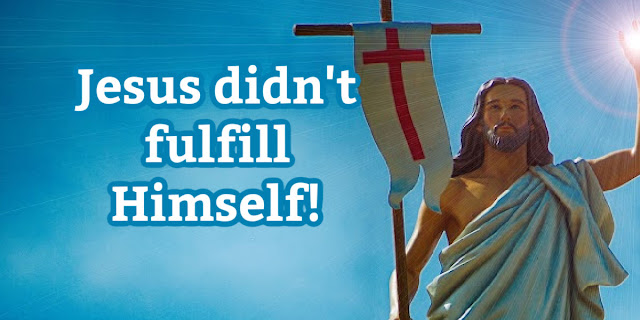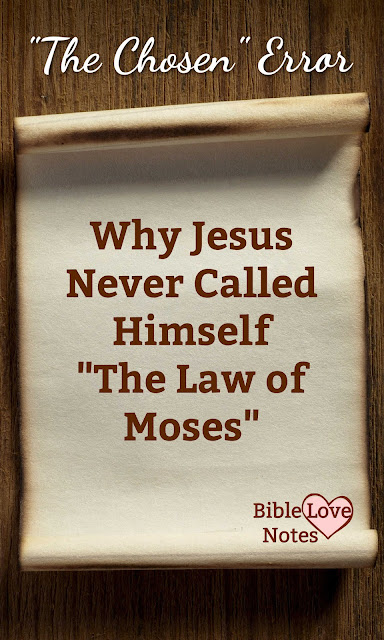In season three of the popular series, The Chosen, Jesus is presented as saying, “I Am the law of Moses.” This statement doesn't resemble anything Christ said in Scripture. In fact, multiple Scripture references offered below contradict such a statement.
Passages Which Contradict the "I Am the Law of Moses" Statement
Romans 3:19-28: Now we know that whatever the law says, it says to those who are under the law, so that every mouth may be silenced and the whole world held accountable to God. 20 Therefore no one will be declared righteous in God’s sight by the works of the law; rather, through the law we become conscious of our sin. 21 But now apart from the law the righteousness of God has been made known, to which the Law and the Prophets testify. 22 This righteousness is given through faith in Jesus Christ to all who believe... 28 For we maintain that a person is justified by faith apart from the works of the law.
Galatians 3:23-24: “Before the coming of this faith, we were held in custody under the law, locked up until the faith that was to come would be revealed. So the law was our guardian until Christ came that we might be justified by faith.”
John 1:17: “For the law was given through Moses; grace and truth came through Jesus Christ.”
↑These passages all explain that the Law of Moses served a different purpose than Christ.
Galatians 3:13: “Christ has rescued us from the curse pronounced by the law.”
Galatians 5:18: “When you are directed by the Spirit, you are not under obligation to the law of Moses.”
↑We are under obligation to Christ (Romans 8:12-13).
Romans 6:14: “Sin shall no longer be your master, because you are not under the law, but under grace.”
↑If Christ was the law of Moses, this would mean we are not under Christ.
Romans 8:1-4: “Therefore, there is now no condemnation for those who are in Christ Jesus, 2 because through Christ Jesus the law of the Spirit who gives life has set you free from the law of sin and death. 3 For what the law was powerless to do because it was weakened by the flesh, God did by sending his own Son in the likeness of sinful flesh to be a sin offering. And so he condemned sin in the flesh, 4 in order that the righteous requirement of the law might be fully met in us, who do not live according to the flesh but according to the Spirit.”
↑Through Christ we are set free from the law. He didn't set us free from Himself.
2 Corinthians 3:7-11: Now if the ministry that brought death, which was engraved in letters on stone, came with glory, so that the Israelites could not look steadily at the face of Moses because of its glory, transitory though it was, 8 will not the ministry of the Spirit be even more glorious? 9 If the ministry that brought condemnation was glorious, how much more glorious is the ministry that brings righteousness! 10 For what was glorious has no glory now in comparison with the surpassing glory. 11 And if what was transitory came with glory, how much greater is the glory of that which lasts!
↑If Christ was the Law of Moses, he would be the ministry that brought death and condemnation.Galatians 2:19-21: "For when I tried to keep the law, it condemned me. So I died to the law—I stopped trying to meet all its requirements—so that I might live for God. My old self has been crucified with Christ. It is no longer I who live, but Christ lives in me. So I live in this earthly body by trusting in the Son of God, who loved me and gave himself for me. I do not treat the grace of God as meaningless. For if keeping the law could make us right with God, then there was no need for Christ to die."
↑There is no way to reconcile this passage with Christ as the law of Moses.
Galatians 3:2-3: "Let
me ask you this one question: Did you receive the Holy Spirit by
obeying the law of Moses? Of course not! You received the Spirit because
you believed the message you heard about Christ. How foolish can you
be? After starting your new lives in the Spirit, why are you now trying
to become perfect by your own human effort?"
↑There is no way to reconcile this passage with Christ as the law of Moses.
Galatians 3:12-13: "This
way of faith is very different from the way of law, which says, 'It is
through obeying the law that a person has life.' But Christ has rescued
us from the curse pronounced by the law. When he was hung on the cross,
he took upon himself the curse for our wrongdoing. For it is written in
the Scriptures, 'Cursed is everyone who is hung on a tree.' "
↑This would mean Christ has rescued us from the curse He pronounced.
Some claim "I Am the Law of Moses" means Christ Fulfilled the Law of Moses
I've heard several teachers try to justify The Chosen's "I am the law of Moses" statement, claiming that Christ is the Law of Moses because He fulfilled it. But fulfilling something does not equate to becoming something. When we fulfill a contract, we don't become the contract. If we fulfill the requirements of the law we don't become the law.
The Law of Moses was part of the unfolding revelation of God ending in Christ's offer of salvation. If we are going to claim Christ is the Law of Moses, we might just as logically claim He is sin because 2 Corinthians 5:21 says, "God made him who had no sin to be sin for us, so that in him we might become the righteousness of God."
But Christ isn't sin. He became sin (took the payment for our sins) and rescued us from sin just as He rescued us from trying to be made holy by obeying the Law of Moses (Galatians 3:13).
Scripture tells us that Christ fulfilled the law, fully meeting its requirements and ending it. See Romans 10:4, Matthew 5:17-18, and Ephesians 2:15.
The law of Moses represents the Old Covenant, and Christ represents the New Covenant.
Believing that the Law of Moses is an accurate name for Christ can't be supported in Scripture. It would mean, among other things, that Christ is the embodiment of "the ministry that brought death." It would mean that we are no longer under Christ, but under grace.
Some claim Christ is the law of Moses because He is the Word.
Others have tried to justify that Christ is the Law of Moses because He is the Word of God and the Law of Moses is part of the Word of God. Using that logic, Christ could say, "I Am the flood" or "I Am the Imprecatory Psalms" or "I Am the Old Covenant" or "I Am the Babylonian Captivity" since all of these things are in Scripture.
But Christ is not pieces of the story. He is the ultimate climax of the story.
Hebrews 10:1 says the law is only a shadow of the good things that are coming—not the realities themselves. See (Hebrews 10:1-25).
Jenkins, the author of The Chosen, claims that when the Chosen Christ says, “I am the law of Moses,” Christ is showing his ultimate authority. But the law of Moses does not hold ultimate authority over us any more.
The Book of Mormon presents Christ as saying “I am the law and the light.” And many people claimed Jenkins purposely included Mormon doctrine because he has partnered with Mormons.
When confronted with this similarity, Jenkins said he hasn’t read The Book of Mormon, but he stands by his quote in the series: “It’s a cool line. So either way, it’s in the show because I believe it’s a really great line and I believe that it’s also theologically plausible.” He went on to say that about 99% of the people who heard the line “went crazy and loved it.” (source)
I believe Jenkins when he says he didn't get it from the Book of Mormon, but it's not “theologically plausible.” And having a majority of people love it doesn't make it any more plausible. We are not in a position to create new "I Am statements" for our Lord and Savior.
Actually, the quote in the Book of Mormon (a heretical book) is more accurate that Jenkin's quote. It says, “Behold, I am the Law, and the light” (3 Nephi 15:9) not “I am the law of Moses.”
Neither quote is accurate, but the Chosen quote is more difficult to defend because it specifies Old Testament law. In 1 Corinthians 9:19-23 Paul differentiates between the Old Testament laws and "the law of Christ," making it clear they are not the same.
I don't believe Christ would identify Himself as “the New Testament law of Christ," but it would be more defensible than claiming He is the Law of Moses.
When The Shack was popular, many Christians defended it despite the fact that it put words in God's mouth that contradicted Scripture. Because Christians refused to speak up, many people were deceived by false teachings in The Shack. Even after the author wrote about his heretical beliefs, some Christians continued to defend the book and movie, claiming it was doing great good for the Gospel.
The Chosen does not have the obvious errors that are present in The Shack, but Jenkins admits to close fellowship with Mormons and he has repeatedly confirmed that he believes Mormons and Christians worship the same Jesus. Despite this enormous lack of discernment, Jenkins claims that God told him that The Chosen would show the world “the definitive portrayal of My people.” (source - 13 minutes into video)
The Bible is the definitive portrayal of God’s people, and if God called someone to produce a series reinforcing the things taught in Scripture, He would pick a man who knows the difference between the Mormon and the Christian Jesus.
This is one of many tests that genuine believers are facing in today's world. Will we overlook error because we enjoy something or because we think it's making the gospel more appealing?
Is it important to reach wide audiences with a slightly distorted truth or smaller audiences with accurate truth?
What will it take for us to be concerned?
-------------------
Additional Resources:
Use Discernment When Watching the Chosen
Be Careful that you Don't Let The Chosen Affect Your Discernment
Jenkin's quotes in this article are found in these links:





No comments:
Post a Comment